
Group Sessions
Bass Guitar LessonsElectric Guitar LessonsAcoustic Guitar Lessons
PREMIUM MUSIC LESSONS
Studio 211
RatesPrivate Lessons
CONTINUE READING
BACK TO LESSONS HOME PAGE
© Studio 211
Introduction
There are many key foundational areas to be covered in the development of musical skill. Regardless of the instrument you play or the style of music, these key areas form a solid strategy for real progress! Beginners should focus on the most necessary foundational skills that deal with technique for basic chords, beat keeping skills and rhythm. More experienced players will be ready to branch out into the other areas to take their playing to the next level. How far you want to delve into each of these areas depends on how far you want to take your music and it is my hope that you never stop learning!
◘ Timing. Mastering holding a steady beat.
◘ Rhythm skills. Learning to count and play rhythm in tempo.
◘ Fingerboard Geography. Learning the notes on your instrument.
◘ Musical Theory. Learning the letter spellings of scales and chords.
◘ Ear Training for Relative Pitch. Identify chords and scales by sound.
◘ Technique Development for accuracy, speed, musical feel and flow.
◘ Song Playing and related theory on chord progressions

Dave teaching Nick Nurse Head Coach of the Toronto Raptors 2019
Acoustic Guitar
Students will be working on lots of songs to rehearse the rhythm patterns, chord shapes and to implement the various playing techniques that you are learning. This way the emphasis is on practicing musical ideas that are super fun! Memorization is a big part of musicianship skill and is imperative for learning a repertoire that you can play without having to rely on charts when you're trying to perform your songs. At this point you may be feeling confident and enthusiastic about joining some of my other students in a group and before you know it you'll be performing on the big stage! For real! Be sure to check out the Group sessions page and Band Program!
Often over-looked fundamentals such as proper positioning of the guitar, left and right hand positions, variable thumb positions on the back of the neck, holding a pick etc are demonstrated in detail. This will certainly speed up your progress in getting the most musical sound out of your playing and will help you to maneuver between difficult chord fingerings. Basic chord shapes are taught with an emphasis on proper strumming technique and rhythm skills. I cannot stress enough the importance of practicing rhythm and learning how to count. Being able to keep a beat while playing rhythm are the most essential skills for every musician.
CONTINUE READING
PREVIOUS PAGE
© Studio 211
Adult and Young Beginners
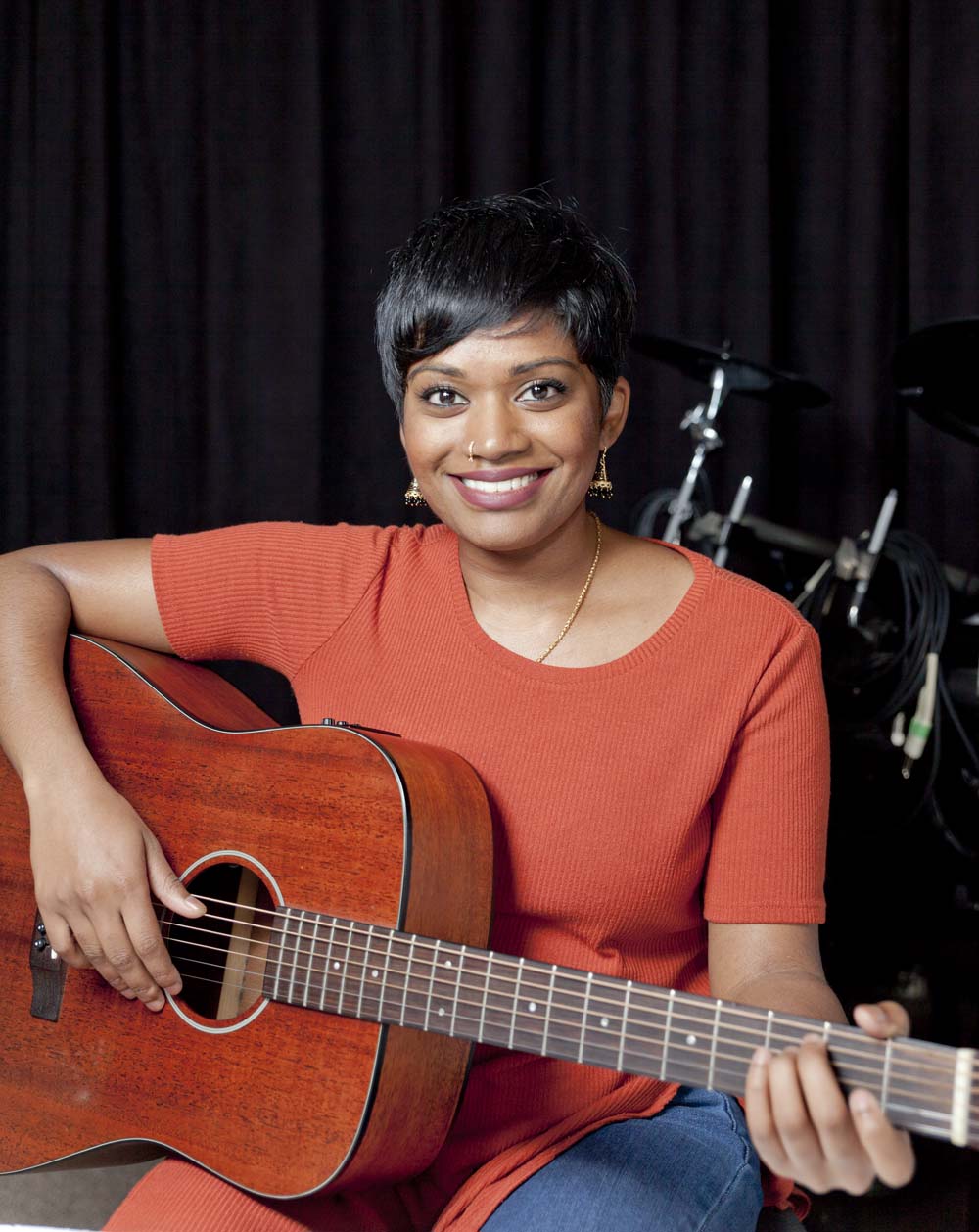
Mayoori Malankov Studio 211
Acoustic Guitar
The Next Level
PREVIOUS PAGE
© Studio 211
The student will begin to expand their chord vocabulary and theoretical knowledge with bar chord formations, chord inversions and more complex and interesting types of chords. Supplementary exercises on scales and arpeggios will help you to continue to build technique, advance your knowledge on the fingerboard and push your creative boundaries. We will move on to more advanced playing techniques that will improve your musical feel, dynamics and phrasing. This would include learning hammer-ons, pull-offs, sliding into notes, string bending, vibrato, palm muting etc. Students are encouraged to study many styles of music in which to discover different rhythmic concepts and unique time signatures for a more well rounded musical education.
Beyond The Basics
MAIN LESSONS PAGE
If you prefer not to use a pick, finger-style strumming and various finger picking techniques will be taught instead. Simple melodies and scale exercises in the first few frets will help develop your technique for chord transitions, improve your knowledge of the notes on the neck and will improve your musical ear. These are skills you will need to begin improvising your musical ideas. The student will also learn the theory behind how to use a capo to change the key of a song to suit their voice and to avoid chords that may be too difficult at the beginner level. This is know as transposition and is a very important skill that really opens up possibilities for song arrangements.
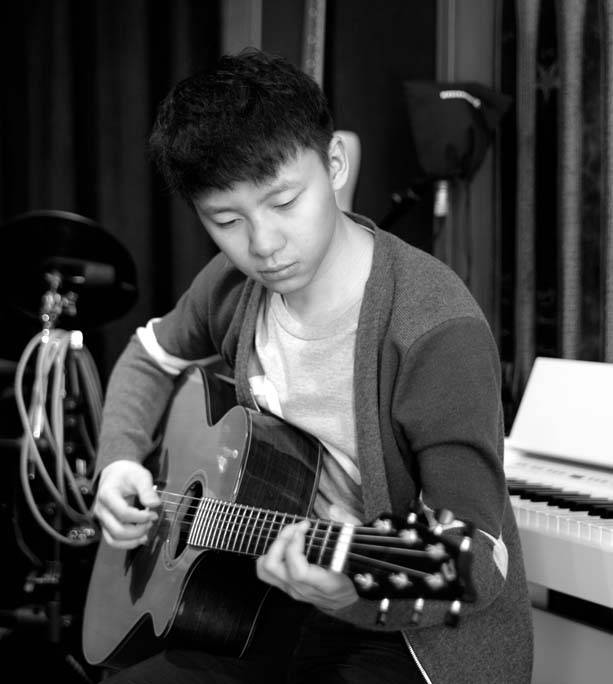
Bowen Wang Studio 211
Private Lessons
CONTINUE READING
BACK TO LESSONS HOME PAGE
© Studio 211
Introduction - Electric Guitar
I'm often asked if a rank beginner should start on an acoustic or on an electric. My answer is acoustic - especially for youngsters. Beginners on an electric guitar work on the same foundational areas listed below as beginner acoustic guitar players. However the playing style to accommodate the sound level and tone are different. The main differences are the techniques used to strum on an amplified instrument vs an acoustic one. I just wanted to point out before jumping in that it's easier to make an electric guitar sound worse - especially for younger kids:) Whether you're a more experienced player looking to up your skill level or a total beginner keen to get rockin' on that electric guitar read on!
◘ Timing. Mastering holding a steady beat.
◘ Rhythm skills. Learning to count and play rhythm in tempo.
◘ Fingerboard Geography. Learning the notes on your instrument.
◘ Musical Theory. Learning the letter spellings of scales and chords.
◘ Ear Training for Relative Pitch. Identify chords and scales by sound.
◘ Technique Development for accuracy, speed, musical feel and flow.
◘ Song Playing and related theory on chord progressions
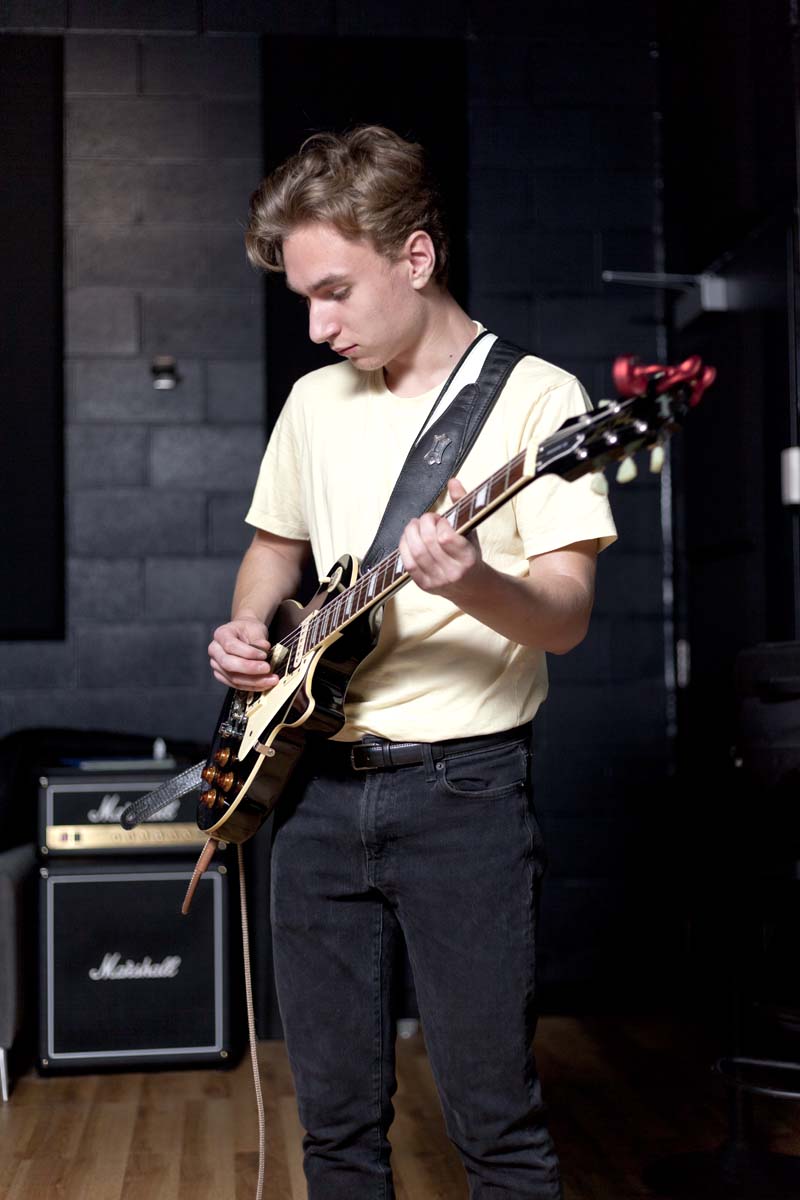
Ben Mouland Studio 211
Electric Guitar
KEEP READING!
PREVIOUS PAGE
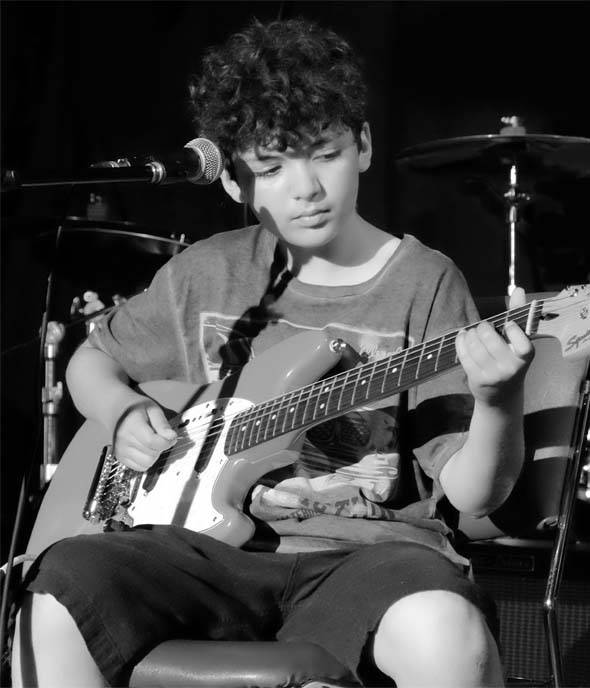
In theory, the fundamentals for beginners on electric guitar are the same as they are for beginner acoustic guitar players. Students learn the basic chord shapes in the first three frets while playing them with simple rhythm and timing skills. This will include suitable strumming patterns for a number of songs as well as single note picking patterns of chords using fingers or a pick or both. Teens and adult beginners would start to learn some scale forms from here and would begin to learn various techniques such as accurate string bending, hammer-ons pull-offs, vibrato and volume dynamics. Tenn and adult students will also learn how to "dial-in" fantastic tone for their guitar as they learn the ins and outs of various amp and pedal settings and eq for clean and over-driven tones.
Adult and Young Beginners
Improvisational skills for soloing over blues, rock and pop progressions using the Pentatonic and Blues Scales are covered in detail in various keys. Students will be introduced to Major scale theory and chord construction which will naturally lead to the study of arpeggios, chord inversions and soloing over chord shapes in each position.
The Next Level
Dante Lopez Gomez Studio 211
Electric Guitar
More advanced players will be learning the theory behind complex chord types, chord progression theory, chord substitutions, theory on modes and other useful scales. Advanced concepts in ear training applied to songs, melodic development techniques and advanced fingerboard geography will dramatically advance your musical ability.
MAIN LESSONS PAGE
PREVIOUS PAGE
© Studio 211
Intermediate to Advanced
Depending on the musical direction you want to take, you can learn to play many different styles of music or just focus on one - it's up to you. Learn to play Jazz, or various styles of Blues, slide guitar, Rock, Pop, Country or Folk.
I provide an opportunity for all of my students to play in a live show every spring and encourage them to get involved in some group sessions that can lead to a fabulous band performance! Live performance is where you really start to develop as a musician and many of my students remark that this is the most valuable musical training anyone could have and I wholeheartedly agree! It's also an enormous amount of fun so sign up and lets do it!

Ian MacKay Studio 211
Private Lessons
CONTINUE READING
BACK TO LESSONS HOME PAGE
© Studio 211
Introduction - Bass Guitar
The main foundational areas of study for instrumentalists are outlined below. These are the main areas for any instrumentalist just starting out. Beginners of course need to focus on the most basic essentials - timing and rhythm, coupled with basic exercises in technique and then branch out into other areas from there. There are several sub-headings in each of these key areas which will be explored in a highly structured way depending on an individuals current ability, musical aptitude and age group.
◘ Timing. Mastering holding a steady beat.
◘ Rhythm skills. Learning to count and play rhythm in tempo.
◘ Fingerboard Geography. Learning the notes on your instrument.
◘ Musical Theory. Learning the letter spellings of scales and chords.
◘ Ear Training for Relative Pitch. Identify chords and scales by sound.
◘ Technique Development for accuracy, speed, musical feel and flow.
◘ Song Playing and related theory on chord progressions
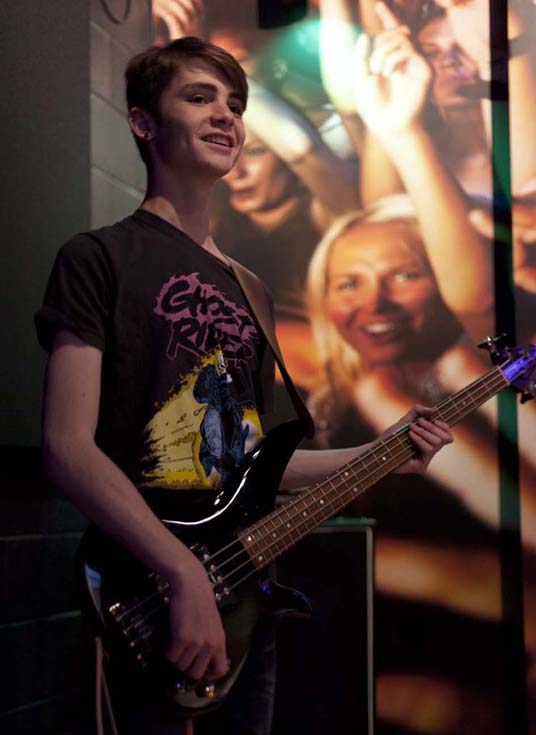
John Powell New Studio 211
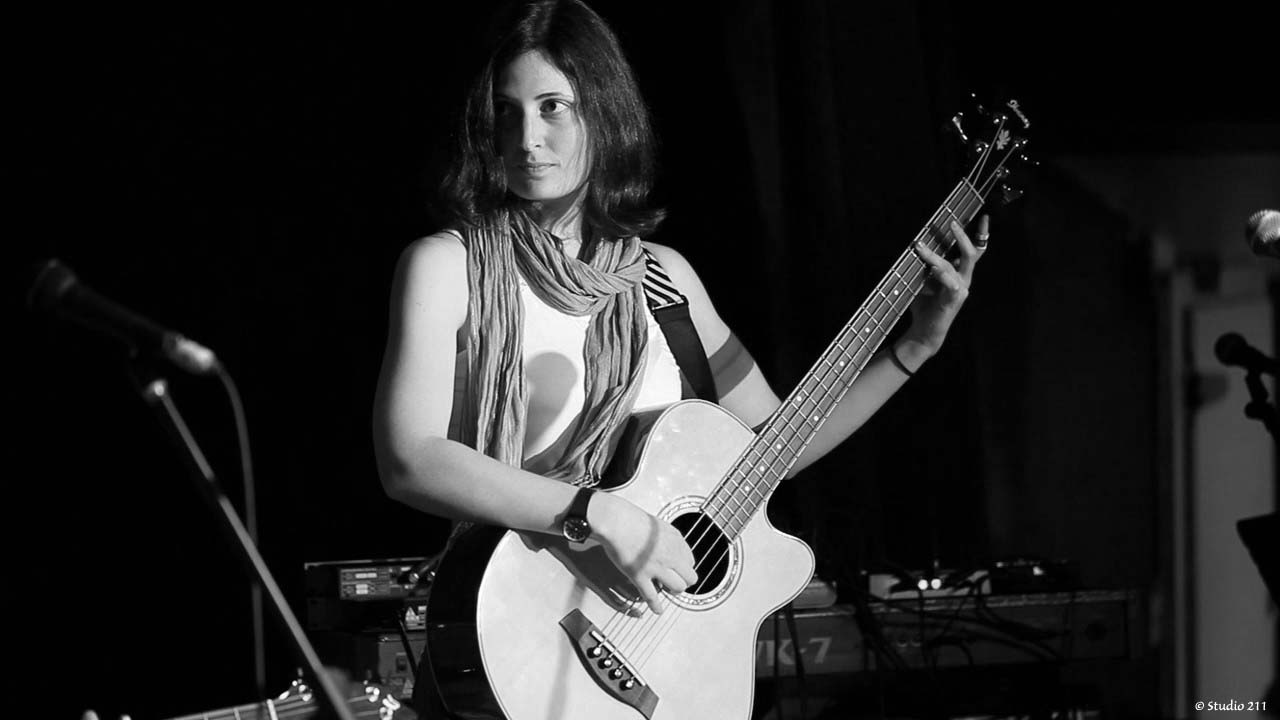
MORE FUNKINESS!
PREVIOUS PAGE
Students will begin to work with super quality drum tracks right away so that they can establish the relationship between the drum kit and the interlocking rhythms of the bass. Through this process students will learn how to "lock" in with a drummer by identifying the precise rhythm patterns on the kick drum and various other parts of the kit. This is a super fun approach and students will have drum grooves to practice over on their own!
Beginner students will be introduced to several techniques that will help them learn the “geography” of the fingerboard. This way they will learn note locations as soon as possible. Some basic theory on the musical alphabet will be necessary to help students learn the spellings of intervals, chord structures and scales. Songs with simple bass lines will be learned with a keen focus on rhythm and timing skills and will progress from the first position to playing bass lines in the upper regions on the neck.
Beginner Studies
Debra Kriger Studio 211
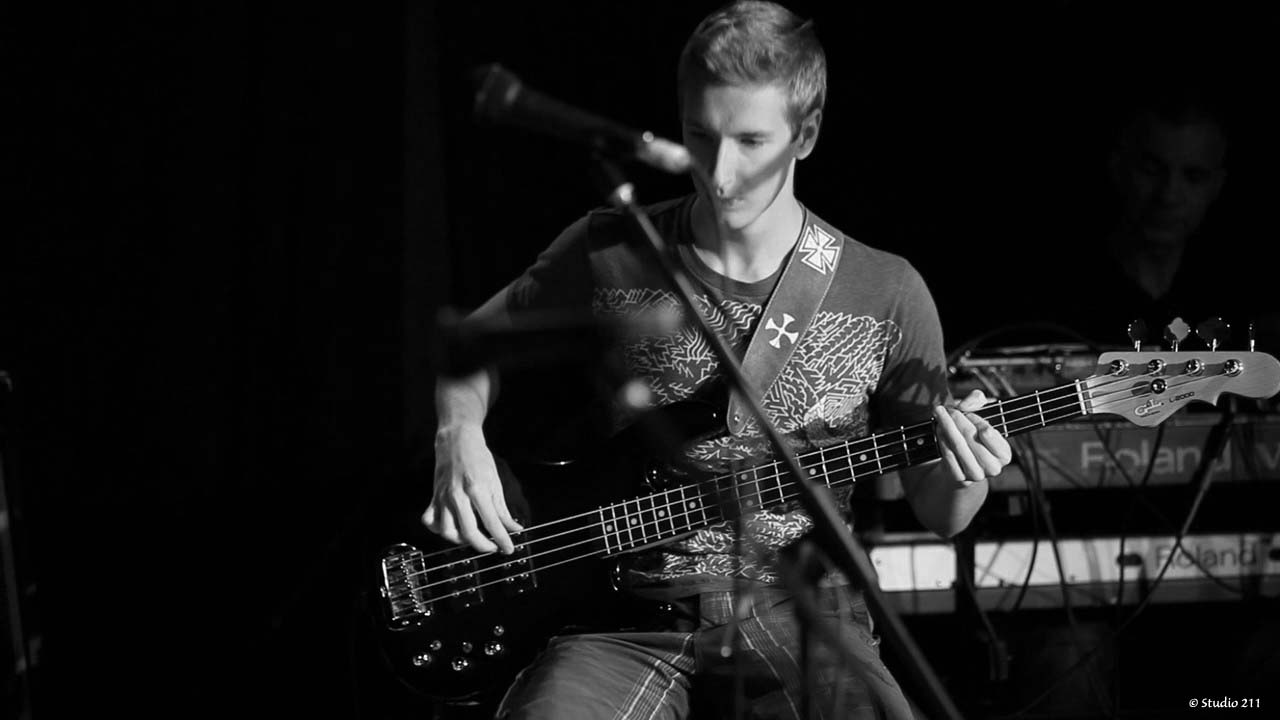
Bass Guitar
To continue to build awe inspiring technique and musical dynamics, students are encouraged to practice some hand-picked classical etudes written for cello and/or double bass. These are an excellent way to learn the relationship of chords and scales in a highly musical context. This will really boost your reading skill greatly enhance your knowledge of the fingerboard!
Musical practice is done in the context of beat and rhythm. Reading rhythm is an essential skill and you will learn to master even complex rhythms reading standard notation. Intermediate students will learn theoretical concepts of bass lines based on Pentatonic scales and basic chords in the form of arpeggios and usable often played chord shapes for bass. Major and Minor scales, key signatures, triads and four-part chords are learned next within the context of some typical Blues and popular music forms.
HIT ME AGAIN!
PREVIOUS PAGE
Intermediate Studies
Andrew Northey Studio 211

Bass Guitar
Students will learn advanced theoretical concepts in harmony and melodic development. Such topics as the harmonization and re-harmonization of scales, chord progressions, chordal functions, substitutions and 'borrowed harmony', the theory and implementation of modes, as well as complex chord formations are covered. Melodic concepts for improving improvisational skills will deal with the topics such as chord scale relationships, melodic figure types and advanced ear training.
Much of your musical ability on your instrument is gained through learning the connection between your voice, ear, hands and your instrument. Vocal coaching is available for bass students who want to take their vocals to the next level!
MAIN LESSONS PAGE
PREVIOUS PAGE
Advanced Studies
Michael Schmidt Studio 211
Group Sessions
Each week I hold a number of group sessions for 2-5 people for acoustic, electric, bass guitar, piano/keyboards and vocalists. Groups are mainly made up with existing students but are open to the public after a brief assessment for placement. Groups are open to all ages and availability of space will vary. These small group sessions are ideal to prepare either for the intensive band performance program or just to have a great deal of fun playing with other people. Having smaller groups means more individual coaching which will help each person get to the next level.
An opportunity to perform with others in your group can be made possible for willing participants. There is an extra fee for this which depends on the local venue available for the performance and all other requirements for that particular group. This will generally include a sound tech and optionally a drummer or other hired side musicians such as keyboards, horn players or strings! If you are interested in performance please check out the Band Program page and also the Video Gallery to see some cuts from our live shows!
MAIN LESSONS PAGE
ACOUSTIC GUITAR LESSONS
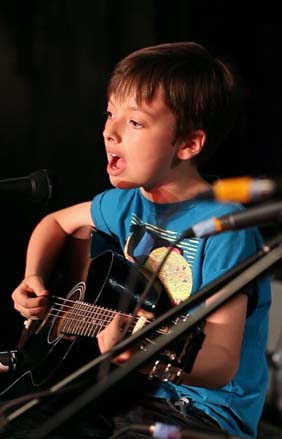

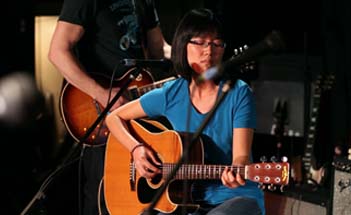

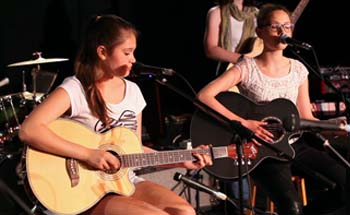
© Studio 211
Casual Group Sessions
Studio 211 Rates
HOME PAGE
BACK TO LESSONS HOME PAGE
© Studio 211
2025
Group Sessions
Private Lessons
Policy
Casual Groups for Enrolled Students
Casual Groups for Non-Enrolled Students
24 hours notice is required if you need to cancel a class. Make-up classes may be arranged for cancellations due to illness, holidays or for school or work related conflicts. Please note that I do not offer refunds for lessons.
Group sessions are typically on a weekly basis but are not mandatory every week. It's most helpful to notify me if you're not able to make the next session so that someone else can have a spot. The group members can change to other groups that suit their schedule better or as a matter of musical compatibility.
Students who are not enrolled in private lessons may join group sessions pending availability. A brief assessment for suitability is required.
Group sessions are an excellent way to prep for the performance program which begins in early March or is just a great way to have fun. Check the Band Program page for more details.
Lesson content for online sessions is usually immediately available for students to view online in an interactive format. Documents are ready for printing or reading online. The content will be delivered before, during or after the sessions depending on needs of the student.
◘ Five one hour private sessions cost $275.00
Online lessons are always available. Try out a 15 minute no obligation trial!
◘ Five half-hour private sessions cost $185.00
◘ Single one hour sessions cost $65.00
◘ Single half- hour sessions cost $42.00
◘ Students enrolled in private lessons pay $20.00 per 1hr group session.
◘ The cost is $30.00 per 1hr session and includes all hand outs.
© Studio 211 Music
Online Sessions over Zoom, Skype or FaceTime
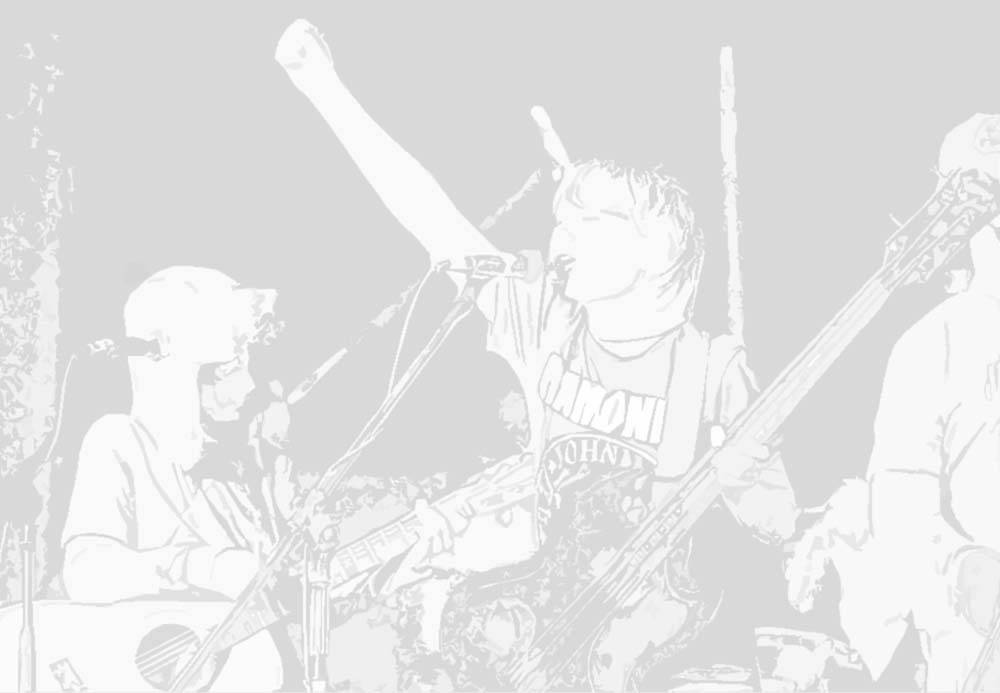
Improve your musical tone, pitch, expression, phrasing and range. Vocal coaching can be part of your private lesson experience with or without your instrument.
Vocal Coaching
5
Intensive classes in theory for beginners to advanced students are available. Ear training for chord types and progressions, types of scales used in melodies, intervals and key recognition. Learn to tune better by ear.
Theory and Ear Training
6
Looking to play in a group to improve your musical skill? Join with a friend or two or ask about joining a group with some other like minded musicians! More info on the Groups Sessions page!
Casual Groups
4
Performance Program
Open to enrolled students taking private lessons. This is an intensive program that runs for approximately 12 weeks and will prepare you for an amazing live concert experience! See the Band Program page for exciting details!
3
Bass Guitar Instruction
Electric Bass guitar lessons in most contemporary styles. Beginner to advanced theory and technique! Check out the Bass Lessons page for the funky details!
2
Lessons are offered for Acoustic, Classical and electric guitar types. Learn to play Jazz, Blues, Rock, Pop, Country, Classical finger-style and Folk. You may borrow an electric or acoustic guitar from me during the lesson if you choose.
Guitar Instruction
1
Studio 211 Programs are open to all ages